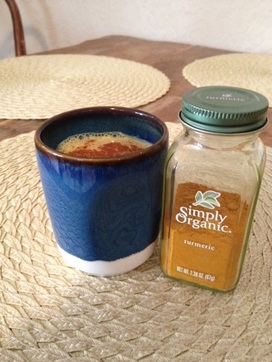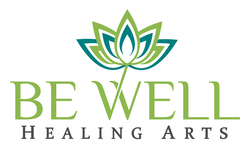
Turmeric is the bright orange spice (it looks like a bright orange ginger root in it's natural state) that comes to us from the Indian culinary and medicinal traditions. It has been used forever in India to make the delicious yellow curry dishes that many of us now know and love. Turmeric also has a long history in Chinese Medicine as a herb used to treat disease (it is called Jiang Huang in Chinese). One of it's main medicinal functions according to Chinese herbal tradition is to alleviate pain almost anywhere in the body--but especially in the chest or abdominal area (think menstrual cramps) and especially the shoulders. It is considered a "blood-moving" herb, which means it helps to move out stagnant blood and increase circulation. According to the book Chinese Medical Herbology and Pharmacology by John and Tina Chen, Jiang Huang (Turmeric) has the following pharmacological actions: anti-viral, anti-hyperlipidemic (lowers cholesterol), anti-inflammatory, anti-neoplastic (anti-cancer), anti-platelet (helps prevent blood clots and increases circulation), and hepatoprotective (prevents damage to the liver). This book is an authority on Chinese medicinal herbs because John Chen is not only trained as a Chinese herbalist but also is a Western Trained Pharmacist.
So in summary: Turmeric can help decrease inflammation (more on that soon), lower cholesterol, prevent blood clots, protect the liver and may have some effect against tumor formation.
Let's talk a little about inflammation. Most of us know that inflammation is Bad with a capitol B. That is very true, when inflammation gets out of control and becomes chronic. It is important to note that some inflammatory processes are actually natural and beneficial for the body. When you injure yourself or even when you get a cold, your body produces inflammatory chemicals to help you heal. That's good. However, inflammation has a tendency to become chronic in our modern world. This is bad because inflammation contributes to numerous chronic disease processes including arthritis, auto-immune diseases, diabetes and metabolic syndrome and heart disease. In addition, there are many diseases with the suffix -itis on the end. You've heard of many of them--bronchitis (inflammation of the bronchial tubes in the lung), tendinitis (inflammation of the tendons), colitis (inflammation of the colon), sinusitis (inflammation of the sinus), etc. All of these conditions have an inflammatory aspect to them. In addition, have you ever had a headache or muscle ache and took an Advil, Aspirin or Aleve and felt better? If so, you have experienced pain caused by inflammation. These drugs are considered anti-inflammatory medicines and the way they work on pain is by decreasing the inflammation that is causing it. So what is the cause of inflammation? According to Dr. Mark Hyman, functional medicine doctor, the most common sources of inflammation are poor diet, stress, sedentary lifestyle, hidden or chronic infections, hidden food or environmental allergies, and toxins in the environment such as mercury, molds and pesticides. So it's best to reduce inflammation by improving these at the source.
Inflammation contributes to body pain, diabetes, auto-immunity, heart disease and numerous other conditions.
Food Is Medicine
Something you can add to your diet that has anti-inflammatory properties is Golden Milk. Golden Milk comes to us through the tradition of Ayurveda--or Indian Medicine. It should be noted that turmeric is a powerful medicine and certain populations should use caution and ask their health care practitioner first before using turmeric medicinally. Those who are pregnant, have congestive heart failure, have gallstones, kidney stones or complete bile duct obstruction should use caution with turmeric (consult a practitioner before using it medicinally). You should also stop turmeric in medicinal doses at least a week before surgery due to the anti-platelet effect. Additionally, those who are on blood thinning medication should talk to their doctor before consuming large doses of turmeric because it can increase the anti-coagulant effect of the drug. According to traditional medicine, turmeric is warm in nature, so those with a hot or warm constitution should use caution with turmeric--if you constantly feel hot in your body or have hot flashes, turmeric may be too warming for you in large doses or over time. You could work with a practitioner of Chinese or Ayurvedic medicine to balance out the heat in your body with other herbs and still be able to use turmeric medicinally.
Golden Milk Recipe
Step 1: Make Turmeric Paste
1/8 cup organic turmeric (dried, ground)
1/4 cup water
1/4 tsp finely ground black pepper
Black pepper is used because it increases the body's absorption of the turmeric. Place all ingredients in a small saucepan over medium heat. Stir until a paste forms. This does not take long, so monitor your pan and don't burn your paste. Transfer into a small glass container. This can be stored for a couple of weeks in the fridge.
Step 2: Make Your Golden Milk
1 cup unsweetened almond milk or other milk (raw dairy, cashew, hemp, coconut)
1/2 to 1 tsp coconut oil
1/4 tsp or more of turmeric paste (start low to see how you respond and then increase)
Sweetener of choice-honey, maple syrup, stevia or coconut sugar (optional) - I prefer stevia.
Add-Ins of choice-cinnamon, vanilla extract, cocoa powder, almond extract, clove, etc. (optional)
Gently heat turmeric paste, coconut oil and milk. Don't allow to boil. Coconut oil is used because fats also help to increase the absorption of turmeric. Pour into your mug and add optional sweetener and add-ins. Play with it to find your perfect drink and enjoy! Drink once a day in the morning or evening.

 RSS Feed
RSS Feed